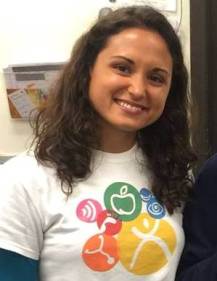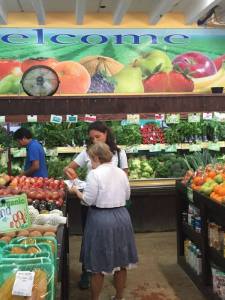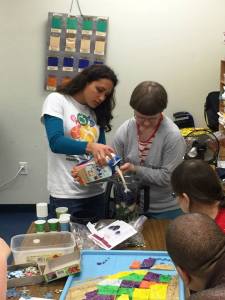Guest Editor: Marissa Menendez, MPEd, MS, Dietetics & Nutrition
My experience at Special Olympics began eight years ago while working as a physical education teacher in Hillsborough County. This is where I had the amazing opportunity to coach a group of intellectually and developmentally disabled students and support them at the Florida state games in Orlando. I was inspired by their motivation, passion and determination to reach their personal and athletic goals. Even when the athletes did not receive first place, they were still smiling and thrilled to be participating in physical activities with their peers. These memories of the athletes, and our experiences training and competing in the area and state games will last a lifetime.
When I walked into Special Olympics Florida Healthy Communities the first day of my dietetics and nutrition internship, those incredible past experiences with Special Olympics came flooding back to me. I immediately realized that I was back at Special Olympics in a different capacity for a very important reason that soon became clear.
Initially, I expected to teach the basics of nutrition and help instill physical activity habits into the lives of the adults at Lucanus Developmental Center and Seagull Alternative High School, but my internship experience exceeded my expectations. It was evident to me from my first wellness class at Lucanus, that I was again the student. These “adults with abilities” were the best teachers that I could have ever wished for. Energy, enthusiasm, love, compassion, support, sincerity, motivation and passion radiated from these students into my life on a daily basis.
Working with Karlyn Emile at Special Olympics South Florida Healthy Communities has been a tremendous character-building experience. As a graduate student and nutrition consultant at the time, I was honored to have the opportunity to educate the intellectually and developmentally disabled population. This honor does not come without its own set of unique challenges. My fellow intern, Danielle Marks, and I soon realized that during our time in the classroom, we were learning just as much as we were teaching. Two weeks into implementing our Health U curriculum, it was unclear as to whether our students were grasping the lesson content. We attempted to promote group discussions and provide an engaging and exciting learning environment, but we received participation from very few students. It was evident that teacher-led discussions were not the most effective teaching strategy because they only reached those with auditory and visual processing capabilities, yet each student has their own preferred learning style. Drawing upon our understanding of psychological and educational theories, we deduced that we should modify each lesson to include an additional component of “hands-on” kinesthetic learning. By tailoring each lesson and activity to account for individualized learning needs, we were delighted when we began to receive feedback from almost everyone in the room.
During the unit on meal planning, the students were given the task to assemble their own version of “MyPlate” using paper cut outs of foods from each of the five food groups. Presented with an array of healthy foods on the table, each student selected their favorite items and pasted them into the appropriate section on the plate. Many students who had never participated in previous lessons flourished in the activity. Everyone was thrilled to share their finished products with their classmates and their caregivers!
As nutrition educators, I learned the value of being able to take complex material and simplify it to the appropriate educational and developmental level of the students. In addition, I learned how to individualize lesson activities in a creative manner, allowing me to meet the needs of the students in the wellness classes, while still preserving the integrity of the material.
Although it’s difficult to pinpoint specific moments and quotes that had the most impact on my life since there were so many, there are a few that I wanted to share with you. The students in the garden club were an eclectic group who each significantly contributed to the class content and overall learning experiences. Dr. Rosen, outstanding professor at Nova Southeastern University, would bring in organic fruits and vegetables from her garden every Friday and we would discuss the health benefits of each and how to incorporate them into delicious recipes. Many of the students would often ask for second servings of green salads and ate every bite! I frequently heard them say, “I love salad,” which was music to my ears! I thoroughly enjoyed assisting Dr. Rosen and the students make smoothies with a variety of vegetables, fruits, nuts and seeds. The students’ faces lit up with excitement as they gulped down their smoothies leaving only a green mustache to prove it. This was priceless!
The trip to Brother’s Farmer’s Market with a small group of students was also an experience that I will always remember. The students participated in a scavenger hunt to find the different colors of fruits and vegetables and we discussed how each benefits the mind/body. They each received gift certificates to buy their own fruits and vegetables to take home to cook and eat with their friends and families. Two of the students said to me “This is the first time that I have been grocery shopping. I love it!” Although this statement melted my heart it also made me realize the positive impact of this trip to the farmer’s market and the vital need for these students to expand their life experiences through other field trips and outings. On the way back, another two students said, “This was the best day ever,” and “Thank you so much for taking us here and teaching us.” Soon after our trip, a student in the garden club was bubbling with excitement to tell me how her parents helped her start a garden and a tomato was now sprouting!
Collaboration on a research study with Special Olympics Florida Healthy Communities and researchers at University of Capetown and FIU, helped me realize that individuals with intellectual and developmental disabilities have a plethora of issues that are specific to this population. As caregivers, teachers and mentors, we need to be their advocates and stand up for their rights, being brave and persevering, showing that these individuals deserve the spotlight and have so much to offer our world if we just give them the chance to be themselves and shine.
Through planning, teaching, presenting, researching and collaborating with Karlyn, Karina, teachers at Seagull, and the other interns; I gained a tremendous amount of knowledge, skills and abilities. Through Karlyn’s dynamic mentorship combined with the perseverance of the Special Olympics’ athletes, I learned how to adapt and overcome any obstacles that come along my path, just as they do. I learned that individuals with intellectual and developmental disabilities need a little extra time, empathy, hands-on activities and patience. These “adults with abilities” teach us all to live in the moment, enjoy the present, and keep stepping forward; demonstrating that no obstacle is too large to overcome. I embrace these life-changing experiences through Special Olympics, as I strive to pay it forward while embarking on my career as a registered dietitian.



